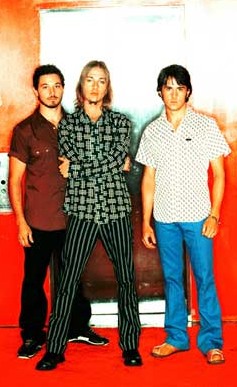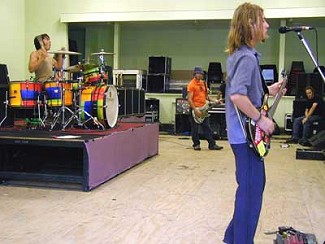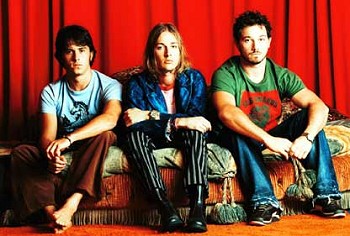INTERVIEW: Silverchair
Daniel Johns Talks About His Reactive Arthritis and More (Silverchair's Web Site)
By: Alex Steininger

 August is a bittersweet month for Silverchair's front man Daniel Johns. On August 27, 2002 the band will celebrate the release of their much anticipated fourth full-length, Diorama, yet they won't be celebrating with a tour, or even a CD release show. That is because Johns has a severe case of reactive arthritis, which has left the entire left side of his body paralyzed. He can't play guitar, let alone get up out of bed and move around.
August is a bittersweet month for Silverchair's front man Daniel Johns. On August 27, 2002 the band will celebrate the release of their much anticipated fourth full-length, Diorama, yet they won't be celebrating with a tour, or even a CD release show. That is because Johns has a severe case of reactive arthritis, which has left the entire left side of his body paralyzed. He can't play guitar, let alone get up out of bed and move around. "I was really run down and there was a lot of stress while mixing the record," Johns says from his home in Australia via telephone. "One day I woke up and was sore, I thought I had sprained my knee while sleeping. Three weeks later I couldn't walk. Rather than getting better it spread to the other knee, the ankles, the back, and my neck. I knew it wasn't something I twisted in my sleep. So I went and visited a doctor and he diagnosed me with reactive arthritis."
This was just days after the band had finished mixing Diorama.
"I'm lucky the arthritis happened at the time that it did because of the record," states an optimistic Johns. " We had just finished mixing it."
Johns has had reactive arthritis for ten months now, forcing the band to cancel any and all touring indefinitely, and that has Johns and the band quite depressed. What's more, Johns' doctors have no clue how long he'll be affected by this disease. It could be a year or could be several years.
"The only time I get up is to go to the bathroom and even then it's painful. I try not to drink a lot of water," Johns says of his condition.
The band's last two records, Freak Show and Neon Ballroom, coupled with his arthritis, have put Johns' expectations of his band in perspective. At sixteen he watched as his band's debut, Frogstomp, went multi-platinum, earning several radio hits and catapulting the band to the top of the charts. The follow-up, Freak Show, though selling reasonably well, failed to remotely reach Frogstomp in sales, and Neon Ballroom slipped even further down the charts.
 "I never really paid attention to sales until the second record," states Johns, "when people started telling me it wasn't as successful as the first. With the first record, I thought that is what you did with records. Recorded them, put them out, and then you sell millions. Though, since the first record, I've dramatically changed my expectations for our records."
"I never really paid attention to sales until the second record," states Johns, "when people started telling me it wasn't as successful as the first. With the first record, I thought that is what you did with records. Recorded them, put them out, and then you sell millions. Though, since the first record, I've dramatically changed my expectations for our records."
Diorama showcases the band's maturity in songwriting. It also marks a turning point for the band, with Johns consciously making an effort to write happier songs compared to the previous three albums? sadder ones.
"The new record is flamboyant, outrageous, and uplifting," Johns says. "I made a conscious effort to make a record that would affect people in a good way rather than the last one, which affected people in a bad way. I had to try and find a way to express happiness without sounding corny. And I think I did a good job of doing so."
"The new record is a more accurate expression of what I want to get across," continues Johns. "With our first two records we backed ourselves into a hole musically. We ran into a lot of critical hurdles. We were perceived as a post-grunge band. The new record basks in colors. When I have a musical or lyrical vision I find it easier to accurately describe what I mean and express what I want."
 "The touring for this album was definitely going to be the most intense touring we've done," explains Johns. "We were really motivated to do something with this record overseas, even though I hate touring."
"The touring for this album was definitely going to be the most intense touring we've done," explains Johns. "We were really motivated to do something with this record overseas, even though I hate touring."
"Touring doesn't kill me and I can handle it," he elaborates, ?but I don't like it, though I want to tour as soon as I'm better, especially America and other big places. I know if I don't tour people will forget the record and you run a high risk of the record failing.
"When I finished the record my goal was to conquer the U.S. and the world. Now I just want to do a few interviews."
Bedridden, Johns is counting the days until he can get out on the road and perform Diorama live. Until then, with only the use of his right hand, he continues to write poetry but is unable to set music to his words.

